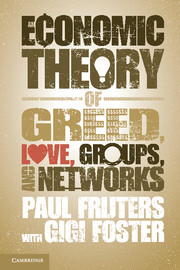3 - Groups and power
Published online by Cambridge University Press: 05 May 2013
Summary
The dominant groups in the world today are competing nation states, each containing millions of citizens living together more or less peacefully but still mainly striving for their own gain. Many other types of groups have also been mentioned in previous chapters, including religious groups, families, army units, and scientific disciplines. They play an obvious role in the fabric of our socioeconomic system. Yet how did all of these groups arise, why are some more dominant than others, and how do they relate to individual humans? The aim of this chapter is to develop a framework for how individuals relate to groups, how groups form, and what the connections are between political power and group entities.
A note on methodology and organization
One way to approach this question is to work from an initial picture of individual psychology, and infer from that psychology what kind of groups and associated power structures would most logically arise. However, this bottom-up approach has a fatal flaw for my purposes, which is that human psychology is so rich and complicated that almost anything could be argued to exist or to be impossible. From categorization theory alone, for example, one would be hard-pressed to predict beforehand the basis on which individuals would categorize one another into groups. Why do we see the most dominant real-world groups forming around things like similarities in country of origin or cause, rather than around similarities in height, gender, or intelligence?
- Type
- Chapter
- Information
- An Economic Theory of Greed, Love, Groups, and Networks , pp. 145 - 225Publisher: Cambridge University PressPrint publication year: 2013



